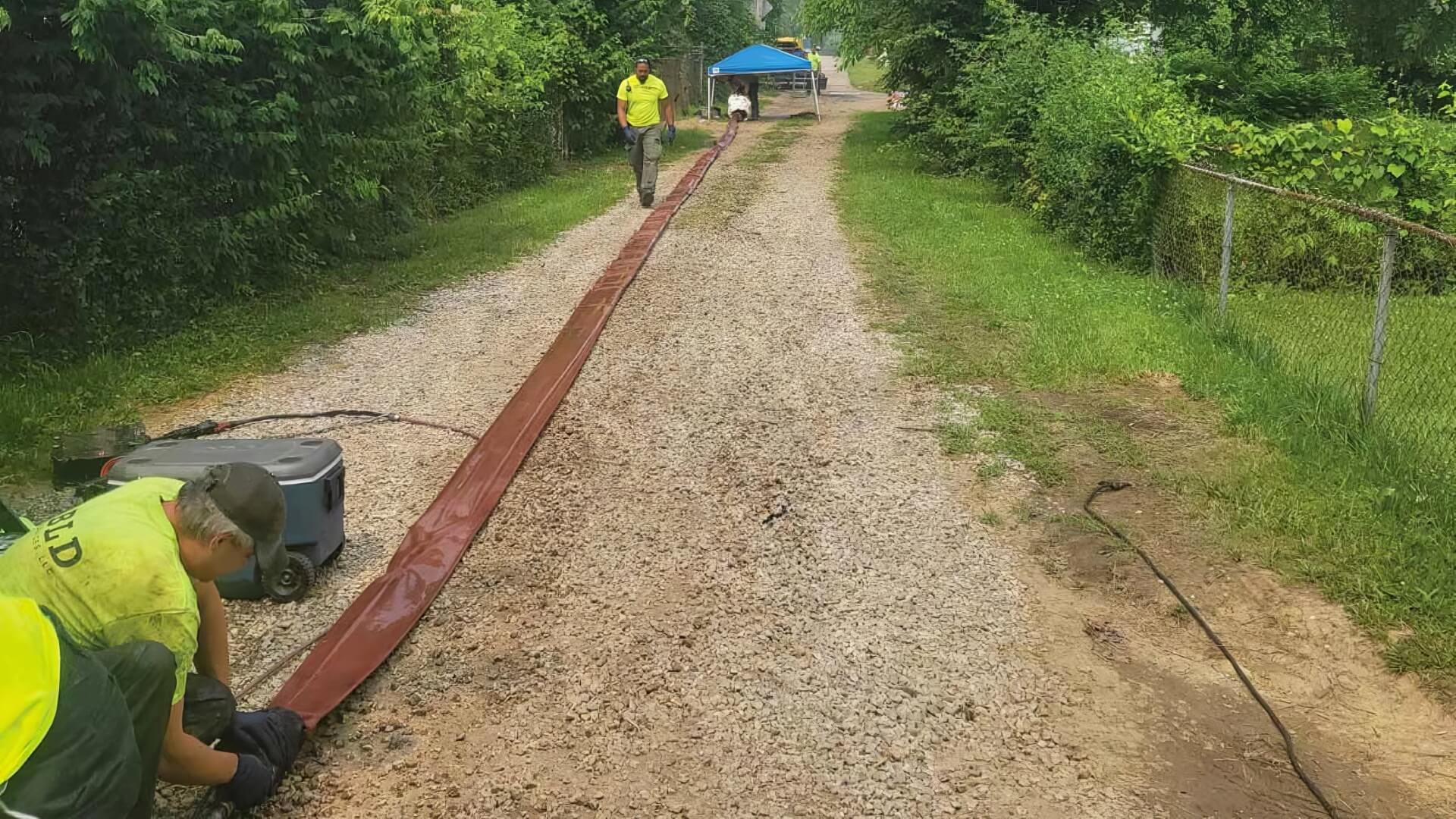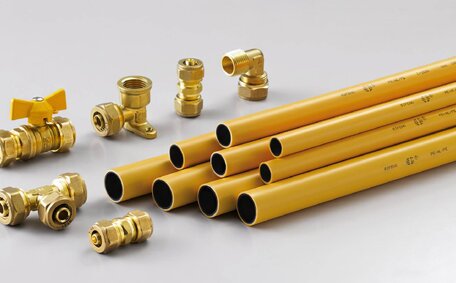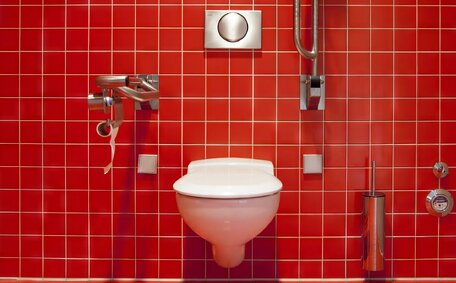How a hot water system works
Your hot water unit heats up water stored in a tank or heating chamber to provide hot water on demand for household needs such as bathing, washing dishes, and doing laundry. Households commonly use various types hot water systems, such as tankless units:
- Gas storage tank hot water heaters - Water is heated by a gas burner fueled by natural gas or LPG. The water is stored in your water tank, which is insulated until needed.
- Electric storage tank water heaters - Heating elements powered by electricity heat the water inside tank walls that are well insulated.
- Tankless/Instantaneous - Gas burners or electric elements heat water as it flows through the system. There is no storage tank.
- Heat pump - Extract latent heat from ambient air to heat water stored in a tank.
- Solar - Use solar thermal panels to collect heat used to warm water held in a storage tank.
A properly functioning water heater can provide a steady water supply of hot water at a preset temperature, as components that need to be replaced are attended to promptly. Insulation maintains water temperature and components like the sacrificial anode and TPR valve help prolong the life of your hot water heater, ensuring it functions safely and reliably.
Types of hot water systems and components
There are several different types of hot water systems used in the Coogee area:
- Storage gas systems - Natural gas or LPG systems with insulated storage tanks. Components include burners, gas valves, an anode rod, drain valve, and relief valves such as the pressure relief valve and thermostat.
- Storage electric systems - Electric elements heat water stored in an insulated tank. Components include heating elements, thermostats, an anode rod and drain valve.
- Tankless/Continuous flow - Gas or electric on-demand systems with no storage tank. Components include heating elements or burners and electronic controls specifically designed for tankless water systems.
- Heat pump - Extract heat from ambient air to heat a storage tank. Key components are the heat pump itself, storage tank, fan, refrigerant gas, and electronics.
- Solar hot water - Solar thermal collectors heat fluid that transfers heat to a storage tank. Includes panels, storage tank, pump, and electronics.
Due to Sydney’s climate and solar incentives, heat pumps and solar hot water systems are popular choices for Coogee homes looking to lower energy costs while accessing hot water.
Key maintenance procedures
Regular water heater maintenance is essential to keeping your system operating efficiently; pursue these maintenance procedures:
- Check and potentially replace the sacrificial anode rod inside the tank every six months to 2 years to prevent corrosion damage.
- Test the TPR (temperature pressure relief) valve once every year by briefly lifting the lever to flush sediment and ensure proper functioning.
- Drain and flush the tank annually to clear sediment buildup.
- Have a licenced plumber perform a system inspection and tune-up at least every five years.
- Make sure to follow manufacturer guidelines for any specific maintenance procedures.
- Reduce your water heater’s temperature to 49°C - 60°C to save energy and prolong tank life.
- Employ a tempering valve and insulate water pipes to enhance efficiency significantly.
Regular heater maintenance for every type of water heater from the expert plumbers at Coogee Plumbing can prevent potential issues, ensure optimal performance, and prolong system lifespan.
Inspect and potentially replace the sacrificial anode
The sacrificial anode rod, which should be replaced every few years, is a crucial component located inside the tank. Made of reactive metals like aluminium or magnesium, the rod attracts corrosion away from the tank itself. Over time the anode rod will erode, so it may need replaced after regular inspection.
Signs that your anode rod may need to be checked or changed include:
- Hot water has a metallic taste or odour
- Rumbling or banging sounds coming from the tank
- Greenish water when a hot water tap is first turned on
- The anode rod is more than 5 years old
Industry recommendations suggest that, along with the anode, the TP valve should replaced and inspected every 2-4 years for optimal corrosion protection. The expert plumbers at Coogee Plumbing can inspect your anode and confirm if it needs to be replaced during a routine hot water system tune-up.
Replacing a worn anode rod will help prevent corrosion damage, prolongs tank life, and ensures your hot water system keeps functioning reliably for years to come.
Flush the water heater tank
Flushing your water heater tank annually removes sediment that can build up inside your tank, thus extending the life of your system. This can improve efficiency and extend your system’s lifespan. Follow these steps to maintain your hot water tanks:
- Turn off power to your heater at the circuit breaker before commencing any maintenance.
- Affix a garden hose to the tank’s bottom tank outlet pipe, a valve functioning as the drain, situated at the base.
- Stretch the hose to effectively drain water outside, positioning a bucket under its end.
- Open the drain valve and allow water to flow out, repeating the process every six months until it runs clear.
- Close the drain valve, refill the tank, and restore power once tank is full.
Flushing a heat pump hot water heater tank using this method can take 10-15 minutes. Sediment draining prevents mineral buildup and corrosion, maximising efficiency. Industry experts estimate it can prevent up to 45% heat loss.
Should the power supply to your heat pump water system require maintenance or repairs, contact the licenced professionals at Coogee Plumbing today on 1300 349 338.
Test and potentially replace valves
The pressure relief TPR valves are crucial safety components on all hot water systems. The TPR valves, also known as temperature relief valves which open to release excess heat and pressure from inside the tank, are pivotal in preventing explosion hazards.
You should test your TPR valve once a year by lifting the lever slightly. Which can allow a small flush of water to flow out, clearing any trapped sediment. If no water flows out when the lever is lifted, the valve may be blocked and need replacing by a licenced plumber to restore proper functioning.
Additional signs your TPR valve needs replacement include:
- Water leaking from the valve
- Valve lever stuck in lifted position
- Corroded or damaged valve components
- Valve older than 5 years
Replacing a faulty TPR valve restores an essential safety barrier that prevents catastrophic tank failures and potential injuries. The expert plumbers at Coogee Plumbing can inspect, test and replace your hot water system’s TPR valve quickly and affordably.
Reach out to us at 1300 349 338 to get your hot water system serviced, encompassing all maintenance needs like TPR valve testing and replacements.
Insulate the tank and pipes
Insulating your hot water tank and pipes will help keep the system efficient and reduce energy costs. Heat is easily lost from hot water systems, but adding insulation can also provide savings on water heating bills and extend the life of your hot water system.
For electric hot water heaters, wrap the tank in an insulating blanket designed specifically for these units.
Make sure to follow manufacturer guidelines. Fibreglass and closed-cell foam sleeves that wrap around the tank work well. Secure carefully to ensure your insulation does not obstruct air vents or control panels.
To keep your water warm, Insulating your pipes not only curtails standby losses but also maintains your water hot as it travels to various fixtures. Use preformed foam pipe insulation sleeves and secure with weatherproof tape. For exposed pipes, consider using insulated boxing products that protect pipes while adding aesthetic appeal.
The expert plumbers at Coogee Plumbing can advise on the best insulation solutions for your home and install pipe and tank insulation professionally. Contact us today to learn more about optimising your hot water system efficiency.
Lower the temperature setting
Lowering your hot water heater’s temperature setting to 49°C - 60°C as part of regular hot water heater maintenance can provide multiple benefits. The most significant impact is potential energy savings of up to 22%. Heating water to extremely high temperatures wastes energy, increases electricity or gas usage, and adds to energy bills unnecessarily.
Setting the water temperature too high also accelerates mineral buildup and corrosion inside the tank, shortening its lifespan. It is very important to note that water heated above 60°C poses a scalding risk as well. To raise or lower the water temperature setting to 49°C - 60°C helps mitigate risks while still supplying comfortable hot water for all domestic necessities.
Adjusting your hot water system’s temperature is a simple DIY task. Just locate the temperature dial or controls on your hot water heater and lower the setting to 49°C - 60°C. Adjusting your hot water system’s temperature is a simple DIY task. Consider lowering your setting today.
Signs your system needs servicing
There are several warning signs that indicate your hot water system is due for servicing:
- Discoloured or cloudy water coming from hot water taps
- Inconsistent water temperatures and fluctuating hot water availability
- Loud noises like banging or rumbling coming from the hot water tank
- Visible leaks around your water heater connections and valves
- Failure to provide enough hot water for typical household usage
These signs could herald potential issues such as sediment accumulation, component malfunctions, or efficiency deterioration in your water heater. Left unaddressed, inattention to these symptoms can lead to more serious problems over time, potentially leading to complete system failure.
Attending promptly to any of these warning signs can help maximise performance, efficiency, and reliability of your hot water system. The expert technicians at Coogee Plumbing offer comprehensive repair and maintenance services to keep your hot water operating flawlessly.
Contact us on 1300 349 338 if you notice any issues with your hot water system. Maintaining your hot water service through regular checks from your local licensed plumbers is the best strategy to avert significant repairs later on.
When to call a professional
There are several scenarios where it is best to call in a licenced professional plumber for hot water system repairs or maintenance:
- Any concerns involving the gas supply lines, valves, or issues related to your gas burners on a gas hot water system. Adjustments to gas fittings should only be done by qualified gas fitters, ensuring your system heats cold water effectively.
- Problems with electrical wiring, heating elements, thermostats, or other electrical components. These can present electrocution hazards if handled incorrectly.
- Leaks from plumbing pipe connections, valves, the tank itself, or other areas. Leaks can worsen quickly and cause water damage if not addressed promptly.
- If the TPR valve is leaking water or not functioning properly. Replacing valves should be done by a licenced plumber.
- When your hot water system stops producing hot water entirely. This likely indicates an urgent repair is needed.
- For advice if your water is discoloured, odorous, or potentially contaminated. Professional diagnosis is needed to identify causes.
- To inspect, replace, or maintain the sacrificial anode rod inside the tank, engage a licensed plumber. The anode rod helps prevent corrosion.
- For major repairs like replacing a faulty heating element, circulator pump, gaskets, inlet/outlet fittings or other integral components.
Our licenced plumbers have extensive training and expertise maintaining and repairing all makes and models of hot water systems. We handle repairs safely, efficiently, and to strict quality standards. Trust the hot water system specialists at Coogee Plumbing for knowledgeable service and reliable results.
For 24/7 plumbing assistance, trust Coogee Plumbing on 1300 349 338.






